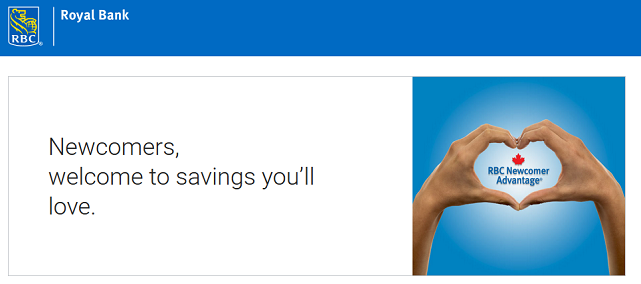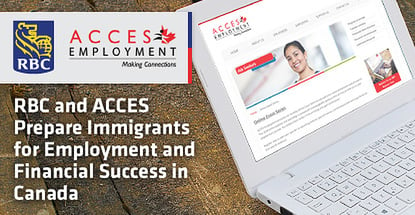In a Nutshell: Canada is currently a top destination for employment for a globally mobile workforce. But newcomers may discover finding a job to be a bigger challenge than they may have assumed based on the employment gaps. Longtime partners Royal Bank of Canada and ACCES Employment have announced a new webinar series to help new immigrants to the country prepare for the job hunt — and for life in Canada. The interactive events will educate newcomers before and after their arrival, helping them to quickly adapt and find employment. These efforts will help new Canadians establish themselves, achieve financial well-being, and contribute to the nation’s economic prosperity. //
According to the study Decoding Global Talent 2018, conducted by Boston Consulting Group and The Network, Canada is the third most-desirable immigration destination for people seeking employment opportunities. This is due in no small part to Canada’s pro-immigration legislation, which has been designed to help grow the nation’s economy by welcoming workers who can fill crucial skill gaps.
However, the job search in Canada may differ from what newcomers have experienced in their home countries. This presents a challenge for which many find themselves unprepared. And it’s made even more daunting by the social, cultural, and financial challenges they also face.
For the past several years, Royal Bank of Canada (RBC) and ACCES Employment have partnered to help prepare immigrants to obtain employment in Canada by providing them with post-arrival advice, résumé-building tips, and interview preparation.
In a July 18 press release, the partners announced a new joint webinar series that will provide direct, interactive information to participants. Educating newcomers before their journeys will help them to be better prepared to meet new challenges and overcome them more quickly when they arrive in the country.

“The online webinar series is designed to help newcomers (including those who have not yet arrived in Canada) gather information that would be helpful in finding employment,” said Ivy Chiu, Senior Director of Newcomer Strategy at RBC.
The series will cover financial literacy and topics relevant to obtaining employment. Each webinar will be hosted by RBC experts, from recruiters to financial advisers, who will present material and answer participants’ questions.
With this more thorough preparation, newcomers will be better able to find employment that fully utilizes their professional skills. This will in turn ultimately benefit not only the new residents but the Canadian economy as a whole.
Early Preparation Eases Challenges at Arrival
“Helping newcomers to prepare for the Canadian job market while they are still overseas is critical to their success,” said Allison Pond, ACCES Employment President and CEO, in the press release.
The webinar format will allow easy, global access to people seeking to immigrate to and work in Canada. Moreover, it will allow RBC and ACCES to provide continuous service and support from the moment newcomers begin preparing to immigrate through their arrival. Laying the foundation for success prior to their entrance into Canada will ease their transition and help them immediately engage in life in their new home.
“Our pre-arrival programs and services ensure that newcomers are able to receive the support they need to integrate into the local labor market much more effectively,” Pond said. “RBC’s support has helped thousands of jobseekers coming to Canada to learn about the Canadian job market and to find meaningful employment upon arrival.”
Expert Guidance for Navigating the Job Search
“Many newcomers often bring skills that are in high demand in our workforce, including engineering and computer science. RBC and ACCES work with new Canadians to identify their skill sets and help them find employment in fields actively seeking to hire,” Chiu said.
The partners help newcomers identify valuable skills they’ve developed in previous experiences and how those can be transferred to a new job. These include professional skills that contribute directly to their work role, and it also encompasses soft skills – personal and interpersonal aptitudes like critical thinking, effective communication, time management, and various other abilities valuable in the workplace.
By understanding these strengths and how they contribute to a job, and by displaying this knowledge through demonstration and storytelling, candidates are more likely to stand out to potential employers.
RBC and ACCES also cover other important topics like communicating with Canadian employers and understanding the expectations they have of applicants and workers. Another crucial subject is networking, both in person and online. Newcomers learn how to connect with people in professions of interest, effectively engage those contacts, and make a good first impression.
This professional education is a win for both sides. Newcomers learn how to find employment and adapt to a foreign work environment. In turn, they are able to fill skill gaps and contribute productively to the Canadian national economy.
Resources and Offers Promote Financial Wellness
Outside its partnership with ACCES, RBC takes other steps to help newcomers achieve financial success in Canada. Its website currently provides educational resources on the Canadian banking system, as well as a Newcomers Advantage Plan with special savings on banking products and access to partner offers.
“We have a number of offers available for newcomers to address their needs, including opening their first account with no monthly fee, buying a home, or establishing credit,” Chiu said.
These products are specifically tailored to meet the needs of immigrants and help them achieve their personal and professional goals. RBC provides additional savings and special deals through partnerships with TELUS, Petro-Canada, and Thrifty.

RBC offers a number of special offers designed for newcomers to Canada.
The bank places additional emphasis on the importance of establishing and building a credit history as quickly as possible. “Credit can be used to help manage everyday finances such as signing up for a mobile phone, buying groceries, and setting up household utilities. Some credit cards offer insurance that protects everyday purchases or reward programs that can be used for cash back, merchandise rewards, or travel points,” Chiu said.
Leveraging Digital Technology for a Successful Transition
“RBC has been supporting newcomers to Canada for close to 150 years. We are committed to making it easier for newcomers to get settled, become established, and to succeed in Canada by understanding their needs and priorities,” Chiu said.
Whether someone comes to the country as a permanent resident, a temporary worker, or an international student, immigration presents a number of difficult challenges. With robust online resources and their new webinar series, RBC and ACCES provides an accessible, interactive resource to assist in effectively addressing the obstacles of being an immigrant in Canada.
“We are helping them overcome some of those barriers, even before they land in Canada, so that they get a head start in their job search, be more prepared when they land, and contribute to Canada’s economy,” Chiu said.
Advertiser Disclosure
CardRates.com is a free online resource that offers valuable content and comparison services to users. To keep this resource 100% free, we receive compensation for referrals for many of the offers listed on the site. Along with key review factors, this compensation may impact how and where products appear across CardRates.com (including, for example, the order in which they appear). CardRates.com does not include the entire universe of available offers. Editorial opinions expressed on the site are strictly our own and are not provided, endorsed, or approved by advertisers.


![6 Credit Strategies to Help You Financially Prepare for the Holidays ([current_year]) 6 Credit Strategies to Help You Financially Prepare for the Holidays ([current_year])](https://www.cardrates.com/images/uploads/2019/10/Holiday-Credit-Strategies-Feat.jpg?width=158&height=120&fit=crop)
![8 Best Credit Cards with No Employment Check ([updated_month_year]) 8 Best Credit Cards with No Employment Check ([updated_month_year])](https://www.cardrates.com/images/uploads/2019/08/noemploymentcheckcreditcards.jpg?width=158&height=120&fit=crop)





